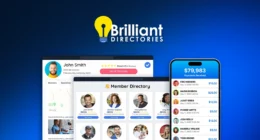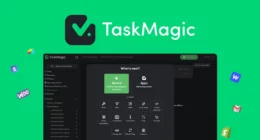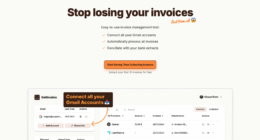Marketing software companies provide digital tools that help businesses manage and automate their marketing efforts. Industry leaders like HubSpot, Salesforce, and Adobe offer extensive platforms for email campaigns, social media management, and customer analytics. These solutions streamline workflows, track ROI, and enable personalized content delivery across multiple channels. From small business tools to enterprise-level systems, modern marketing platforms increasingly leverage AI and machine learning to enhance customer experiences. The evolving landscape of marketing technology holds powerful solutions for growing businesses.
Quick Overview
- HubSpot dominates the marketing software industry with comprehensive automation tools for businesses of all sizes.
- Salesforce and Adobe Experience Cloud provide enterprise-level marketing solutions with advanced analytics capabilities.
- Exclaimer specializes in email signature management, while Hootsuite leads in social media marketing software.
- Modern marketing platforms integrate AI technology for personalized customer experiences and automated workflow management.
- Key industry players offer essential features like data analytics, campaign automation, and customizable reporting for ROI tracking.
The Evolution of Marketing Software Solutions

The evolution of marketing software solutions spans several decades of remarkable technological advancement and innovation. The journey began in the 1980s with the introduction of ACT! CRM system, which pioneered database marketing and manual customer data collection.
A significant transformation occurred in 1999 when Eloqua launched the first modern marketing automation solution, while Salesforce revolutionized CRM accessibility through per-seat pricing.
The industry gained momentum in 2006 with the emergence of key players like HubSpot, Pardot, and Marketo, introducing concepts like inbound marketing. Modern solutions now emphasize content creation strategies to deliver personalized customer experiences across multiple platforms. Many businesses now leverage omnichannel automation tools like Omnisend to seamlessly integrate their marketing efforts across email, SMS, and social media channels.
The 2010s marked a period of industry consolidation, with major acquisitions by Oracle and Salesforce.
Today’s marketing software landscape emphasizes AI integration, data privacy compliance, and predictive analytics, reflecting the growing demand for thorough, integrated marketing platforms that can handle omnichannel customer experiences.
Top Players in the Marketing Software Industry
While the marketing software landscape continues to evolve rapidly, several dominant players have emerged as industry leaders through innovation and consistent market performance. HubSpot leads the pack with its extensive marketing automation platform, while Salesforce and Adobe Experience Cloud cater to enterprise-level needs with robust feature sets.
Rising stars are making significant impacts in specialized areas. Exclaimer has gained recognition for email signature management, while ZoomInfo and Hootsuite dominate sales intelligence and social media management respectively. Blueshift has revolutionized marketing with its AI-driven platform for delivering personalized customer experiences across channels. These platforms excel at customer segmentation capabilities to deliver targeted messaging across email, SMS, and social channels.
Specialized marketing tools like Exclaimer, ZoomInfo, and Hootsuite have carved out dominant positions in their respective niches.
The industry also sees strong competition from AI-powered solutions, with companies like Braze and AB Tasty revolutionizing personalization and mobile marketing.
Traditional leaders face growing competition from specialized solutions like Semrush for SEO and Constant Contact for email marketing, creating a diverse ecosystem that serves various marketing needs.
Essential Features That Drive Marketing Success

Modern marketing software must incorporate specific features to deliver meaningful results in today’s digital landscape. The most successful platforms combine automation, analytics, and personalization to create powerful marketing solutions that drive business growth.
Key features that make marketing software indispensable include:
- Automated workflows that streamline lead nurturing, email campaigns, and social media management, saving valuable time and resources. Real-time alert notifications ensure team members stay informed and responsive throughout all marketing processes.
- Extensive data analytics with customizable reporting and visualization tools for tracking ROI and campaign performance. These platforms facilitate data-driven decisions to enhance campaign efficiency and reduce overall marketing costs.
- Seamless integration capabilities that connect with existing business tools while offering scalability for future growth.
- Advanced targeting features that enable personalized content delivery and customer segmentation based on behavior and demographics.
These essential components work together to create effective, measurable marketing campaigns that adapt to changing business needs while maintaining user-friendly operation.
Selecting the Right Marketing Software Platform
Selecting an ideal marketing software platform requires careful consideration of multiple factors that directly impact business success. Organizations must evaluate their specific needs, technical requirements, and growth objectives to make an informed decision that aligns with their goals. Popular solutions like email campaign tools have become essential for modern marketing operations.
| Evaluation Area | Key Considerations | Priority Level |
|---|---|---|
| Business Needs | Goals, Budget, ROI | Critical |
| Platform Features | Automation, Analytics | High |
| User Experience | Interface, Support | Medium |
| Security | Data Protection, Compliance | Critical |
The selection process should begin with a thorough assessment of business requirements and team capabilities. Companies need to examine platform features, scalability options, and implementation complexity. Conducting comprehensive demos and trial periods provides valuable insights into platform performance and suitability. Additionally, security protocols and compliance standards must be carefully reviewed to guarantee data protection and regulatory adherence.
Future Trends Shaping Marketing Technology

As marketing technology continues to evolve at an unprecedented pace, several transformative trends are reshaping how businesses connect with their audiences. The integration of AI and machine learning stands at the forefront of this evolution, with 73% of marketers already incorporating these tools into their daily operations. Video content has become essential for brand engagement, with marketers focusing on creating under 2-minute videos for maximum impact. Modern businesses are leveraging attribution modeling to accurately track and measure the effectiveness of their marketing efforts across multiple channels.
Key trends driving the future of marketing technology include:
- The convergence of marketing and advertising technology, creating seamless customer experiences across all channels.
- Advanced data analytics enabling real-time decision-making and precise targeting.
- AI-powered personalization systems delivering tailored content at scale, with personalization leaders 40% more likely to exceed revenue goals.
- Emerging technologies like voice search and chatbots, with customer spending via chatbots expected to reach $142 billion by 2024.
These developments are fundamentally changing how businesses approach customer engagement and campaign optimization.
Frequently Asked Questions
How Long Does It Take to Migrate Data to a New Marketing Platform?
Data migration typically takes 3-4 months from start to finish, though the actual transfer might only take hours or days.
The timeline breaks down into three main phases:
1-2 months for planning,
1-2 months for execution,
and 1 month for post-migration monitoring.
Factors like data volume, complexity, and chosen migration method can extend or shorten this timeline.
For best results, organizations should conduct thorough planning and testing before beginning the actual migration.
Can Marketing Software Integrate With Custom-Built Internal Business Applications?
Yes, marketing software can integrate with custom-built internal applications through various methods.
Most modern marketing platforms offer API connectivity, webhooks, and custom integration options that enable seamless data flow between systems.
Developers can use REST APIs or SDK tools to create tailored connections that sync data, automate workflows, and extend functionality.
While integration complexity varies, options like middleware solutions and direct API connections make it technically feasible for most business scenarios.
What Security Certifications Should Marketing Software Providers Have?
Like a fortress protecting precious treasures, security certifications shield sensitive data.
Marketing software providers should prioritize obtaining:
- ISO 27001, which demonstrates thorough security management
- SOC 2 Type II certification, essential for handling customer data
- GDPR compliance, particularly when serving European clients
- CSA STAR certification if offering cloud-based solutions
These certifications validate the provider’s commitment to data protection and build trust with clients who entrust their valuable marketing data.
How Often Do Marketing Software Companies Release Updates and New Features?
Marketing software companies typically release updates on multiple schedules. Major feature releases occur quarterly, while minor updates and bug fixes happen weekly or bi-weekly.
Cloud-based solutions can push updates automatically, while on-premise software follows scheduled release cycles. The fastest-growing areas for updates include AI capabilities, data integration features, and security patches.
Companies often announce their release schedules publicly and provide detailed documentation for each update.
Are There Industry-Specific Marketing Software Solutions for Specialized Markets?
Healthcare providers like Memorial Health System often use specialized marketing software designed for patient engagement and HIPAA compliance.
Yes, industry-specific marketing solutions are widely available, tailored to unique market needs. These solutions typically include features like compliance tools for regulated industries, vertical-specific analytics, and integration with industry-standard databases.
Common specializations include healthcare, finance, real estate, and nonprofits, each with customized tools addressing their particular challenges and requirements.
Conclusion
Marketing software continues to evolve like a digital Swiss Army knife, offering businesses increasingly sophisticated tools to reach their audiences. As companies navigate through the vast landscape of available solutions, choosing the right platform requires careful evaluation of features, scalability, and integration capabilities. With artificial intelligence and automation leading the way, marketing technology will continue transforming how businesses connect with customers, making data-driven decisions more accessible and impactful than ever before.








